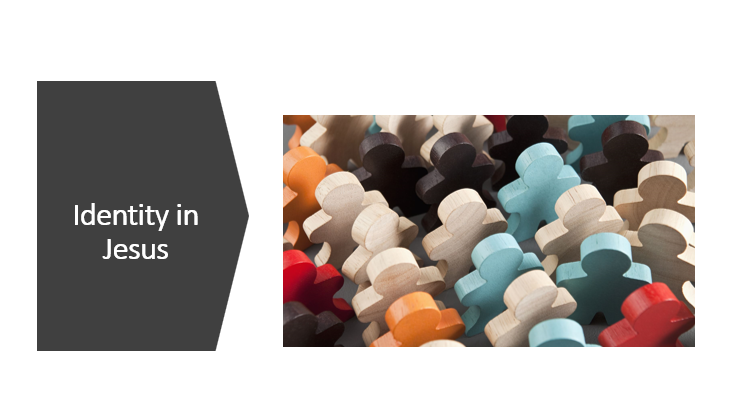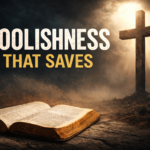
Text: Luke 24:36-49, 1 John 3:1-7
Theme: Identity in Jesus
Edited transcript[1]
____________________________
Intro – Dear friends in Christ, what is your “story of everything”? What is the story arc that explains life as you know it and as you live it? I borrowed this concept from Professor Okamoto(Concordia Seminary, St Louis), when he talks about the idea that every person lives under a “story of everything”, which explains where you are and who you are.
For example, for somebody the story of everything could be: “this universe showed up and people starting to show up and everything showed up; you live a life, and then you disappear at the end.” For another person: “you were born with a purpose, you have a family, you have a job and then you grow older, you retire and eventually you pass away.” And others. Somebody even could say, “well, I think this life is meaningless. You live just randomly in this world.” Well, again, that’s a way to explain how everything works – life is randomness.
As Christians, we have a story of everything. We know where we came from. There’s a God creator. We know who we are, children of God. We know our purpose in life, serving God and others, and we will eventually have an end – which is not an end, but a new beginning.[2] However, in the context in which we live today, we often become entangled with other stories to the point where we lose sight of our own.
One prevalent trend I observe is this: We tend to compartmentalize our Christian life, considering it as just one side, one part, one compartment of our life. We may see church as a place we go, and faith as something we practice in a few minutes of our week.[3]
This mindset is understandable given the cultural shift around us. The cultural scaffolding that once supported our Christian heritage has been dismantled. Public spaces no longer display crosses, Christmas has become merely a holiday, and Christianity is now seen as just one among many options, perhaps not even the best one.[4]
These changes in our society sometimes make us mourn the passing of a bygone era. However, I see in this shift an opportunity. An opportunity to reflect upon and act upon our Christian identity. An opportunity to reconnect with our story of everything, the source of who we are and what we do—the Story of God.[5] We can go back to that story and to remember that this story is not just a book in a shelf. It’s the story that shapes who we are and where we are going.
The readings for today help us to remember the basics of our story of everything.
1 – The Word
The first significant aspect of this identity-shaping story of everything is God’s Word. In Luke 24, we read about how Jesus opened the minds of his disciples to understand the Scriptures.
“Well, that’s common sense, Pastor. Of course it is the Word.” Yes, of course, but the Word has been under attack, or at least under scrutiny and under reinterpretations. It is not too hard to find instances in which even the Bible is utilized to validate narratives that are not our narrative, our story.[6] This is what God decided to reveal for all of us so that we can understand where we came from and where we are going to. This shapes the story arc of our life.
Jesus takes Moses, and the prophets and the Psalms to show how, from the Old Testament leading into the New Testament, that this is our story. The same prophets, the same people who were there, it’s you now and it’s going to continue to be. The entire Bible is the counsel of God, and if we were to summarize our story of everything, it would have five acts:
- Creation
- Calling and formation of a people
- The coming of the Messiah and his work
- Resurrection
- The promise of Christ’s return.[7]
Above all, Jesus is the central figure of the Scriptures. Our identity is in Him, our faith is in Him, and our life is in Him.[8]
Now, as a community, we are not here merely to assent to the Truth. It’s not enough to say, “The pastor preached a good sermon today, and I agree with him.” While that is a starting point, we are called not only to assent to the truth but to embody it in our lives. It’s important to remember, you are called not just to say, “that’s nice, pastor. I agree.” We are called to embody it so that it becomes part of who we are as Christians. Of course, still imperfect. We still stumble and fall and sin. But by the action of the Holy Spirit of God, we are led to make of this Word not just an intellectual truth I agree to, but something that goes through my body and into my life. I embody it. I live it.
This realization leads us to the second point of our identity-shaping story of everything: our life in community.
2 – COMMUNITY
Our North American culture tends towards individualism. We have our personal space, our own stuff, etc.. There’s lots of good things about that. But sometimes it makes Christian faith, the Christian story and Christian life mean much more about you and God, and we downplay the you and your family of faith aspect of it. For example, Holy communion. Someone might say, “nobody can say anything, it is about me and my God”, forgetting that there’s people around them. Or “I go to church and it’s me and my God.” But what about all the people around you?
We are a community. We are people together, children of God. This tension happens even in language. In English, you can be both singular and plural, right? So if I say to you, Christ died for you, I’m thinking plural because I’m seeing you in front of me, but you sitting on the pew looking to me you may think singular. “Christ for you.me”. Isn’t that true? We usually think in singular. I’m talking to you, but I’m talking to all of you. Of course, both dimensions are present, but sometimes we stress one, me; me and God, nobody else has nothing to do with it. And we forget the you, the community together.
Saint John reminds us of that. Let’s read together.” “See what kind of love the Father has given to us that we should be called children of God. And so we are. The reason why the world does not know us is that it did not know him. Beloved, we are God’s children now and what we will be has not yet appeared. But we know that when he appears, we shall be like him because we shall see him as he is. And everyone who does hopes in him purifies himself as he’s pure.”(1 John 3)”
Children of God is plural. John is writing to a congregation. By the way, the whole New Testament was written to be read in front of a congregation, not for people to take a copy home and to read. The original purpose was that the congregation together would hear it. Community.
Now, I have heard this phrase many times: “Why do I need to go to church? I can read the Bible and pray at home.” It seems very reasonable. You know, Christ is everywhere. He’s there with me in my room and when I pray and everything and that’s all true. The problem is this was never ever present in the story of Christian church. From its inception, Christianity has been about community. It is about being together, the Body of Christ.[9] I know there are some individual aspects to it. Jesus says, go to a room, close the door, have your prayers. The the creed will say, “I believe”, not “we believe.” There is the personal aspect of faith. But sometimes that is stressed too much over the communal dimension. Paul says we are the body of Christ. The body has individual members, but all together connected to Christ.
The Christian Church has always emphasized her communal dimension. We are Baptized into the family of God, we share in the Sacraments together, and we are called to live in community. We are one together in Christ. Yes, do your personal practices. Read your Bible at home. Pray at home. Please do that. That’s very important. But as Christians, we have always to be reminded that this is how we started: as a community.
This is our story of everything. We are a community created by God, carried by God, following the Lord Jesus Christ until He calls us home, until He brings this world to an end. So we are called the people of God, not just the person of God. Our story of everything, our identity in Christ reflects the word been shaping us and bringing us to live as a community.
There’s this author, he works with building communities for companies like Google and others. In his opinion, an authentic community, as opposed to a mirage community, has three key elements”
shared values,
practice of those shared values,
caring for one another’s well-being.
How would we care for one another’s well-being by just praying and reading our Bible in the recess of our own bedrooms or houses? I know, today you can say, “I can pick up my phone and connect.” You can, but that still implies community. You are reaching out to somebody other than yourself. So in the church, we have shared values that come from the word. We have the practice of the shared values. We have the Sacraments, we have our worship, we have our actions as a church, and we strive to have caring.
Remember you and God, God and you. Let’s pluralize it a little more. As a community, we are here also to care for one another the way we can. I’m not saying you have to sit down with everybody around you and listen to everyone’s problems. Our affinities may vary, but we want to care for one another. We are building community because we have values, we share those values, and we care for one another.
3 – Faith in practice
As we do that, we live our faith. John helps us here again, let’s read together. “Everyone who makes a practice of sinning also practices lawlessness. Sin is lawlessness. You know that he appeared in order to take away sins, and in him there is no sin. No one who abides in him keeps on sinning. No one who keeps on sinning has either seen him or known him. Little children, let no one deceive you. Whoever practices righteousness is righteous as he is righteous.”(1 John 3)
The way we live reveals our identity. If you are in Christ, when John says, if you are in Christ, you don’t sin anymore. It means you are not intentionally engaging in things that don’t belong to our story as a Christian. You will eventually fall and stumble and sin, and you need forgiveness constantly. But in your story of everything, your identity in Christ, you will avoid engaging intentionally in those things that are not connected to who you are. So John is inviting the children of God, the community together, to reveal their identity to the world as they live it.
John is the “apostle of love.” If you read that epistle, love oozes around all the letters there. There’s a story about John, I don’t know if it’s a legend or if it just to illustrate the point. He would come to the pulpit every Sunday and say, “love your brother and sister, amen.” Next Sunday again, “dear brothers and sisters in Christ, love one another, amen.” Until somebody said, “won’t you change your sermon every once in a while?” He said, “well, when you start to practice what I’m saying, then I’ll move on to the next subject.”
In the passage from 1 John 3, we see the contrast between those who practice righteousness and those who practice sinning. How we live reveals our true identity as either children of God or children of the devil. Our actions reflect our identity. We are called to pursue purity and righteousness. Through Christ, we have victory over sin. Jesus came to take away sins and destroy the works of the devil, and we can experience freedom from the power of sin in our lives. That is why we love. We constantly love one another.
We show faith active in love in three ways:
-Love as those nice feelings. “I love you. I like to hang out with you and everything. I say good things. I tolerate many things.”
-Second way, sometimes you have to be firm. If you’re a parent, you know that. Sometimes you love by demonstrating firmness and discipline.
-And the third one, often forgotten by us, go beyond. Go beyond anybody else who do. Jesus says, if somebody asks you to walk a mile, walk two. If they hit one side, give the other side. Jesus is stimulating us to go beyond. People may call you a fool. But you desire to do this because you desire to share, to care for another person – if you can, when you can, as you can.
Remember, I said at the beginning, we are called not only to assent to the Truth of the Scriptures, but to embody it. This is our story of everything. We have the word shaping our life. We have our sense of community shaping who we are together as a community. And we have the practice of love, the way in which we embody it. Loving God and loving one another, loving as Christ has loved us.
Conclusion – Our story of everything is found in the pages of the Bible. It is found in our personal experiences and is found within our community, the body of Christ. We embrace our identity in Jesus, living out our faith with love and righteousness, and growing together as a community of believers. Our Christian identity is not just a compartment of our lives. It is the very essence of who we are. This is the story by which we live, by which we were created. And the best of all, it’s the story that we already know how it ends. Amen.
_______________________________________________
[1] Transcribed by TurboScribe.ai.
[2] This is our “story of everything.” This is how life is explained from our Christian optics. However, as Christians, we live in a world with so many other “stories of everything”, so many other offers of ways to understand how life works, that sometimes we may get a little intertwined with them, and then our story gets entangled with other stories that are not our story. And then a phenomenon may happen that in which our Christian life becomes a compartment of our life, like a drawer. Here is my Christian life; I go to church, I do my prayers, I read my book, my Bible, and that’s it. And then here’s the my drawer of being a father. Here’s my drawer of being a sports fan. Here is my compartment in life where I serve my community, and so forth. We may have our story that should be of explaining our life as a whole as just this part that explains my commitment to my church, for example.
[3] There’s different ways to explain this situation. My guess is that because for so many years and even centuries, the Western culture was shaped into the form of Christian values, because they were everywhere, the church was only one of the parts of everything around us. You remember those days when commerce were closed for Sundays? You remember when prayers were done in schools? When crosses were in public places? Nativity scenes could be seen all around, not just lights and good wishes. So it was kind of natural that church was just one part of that. You go to church on Sunday and it’s kind of reinforced already around you as you go through your week.
[4] However, if you look back, this cultural scaffolding around our Christian faith, it’s gone. Is there any public school that still does prayers? Christmas is not Christmas anymore, it’s Holidays. Crosses cannot be hanging in public spaces anymore. Perhaps if you put a nativity scene in your house, neighbours will look like, “oh, that’s strange”. That reinforcement culture usually would give us, at least here in our context, it’s kind of gone, gone. And I don’t know if it’s coming back anytime soon. But still the church remained there, in that compartment. I go to church on Sunday. I do my prayers in my room, etc… But my life needs to be explained by other stories too. I have to fit into society, playing all roles I have. And then I am tempted to keep this one on the side here, because here I have to kind of act a little differently to fit in the World.
[6] Sometimes the Word is dismissed. “Well, this part here talks about God of armies. God is God of love, not God of armies. So this is not the Bible.” The New Testament talks about Jesus loves everybody. “That’s good. That’s the Bible”, and so forth. You start to, you know, pick and choose. But for us Christians, our true identity, our story of everything is built on the fact that the Bible from cover to cover, from Genesis to Revelation, that’s the full counsel of God. This is what God decided to reveal for all of us so that we can understand where we came from and where we are going to. This tells us the story arc of our life.
[7] Wright, John W. Telling God’s Story: Narrative Preaching for Christian Formation (IVP, 2007). The first act, God creates the world, creates everything, didn’t come out of nowhere or by randomness. There’s a creator. Second, then he forms his people. He takes them out of slavery and brings them to the promised land. And this is my people, Israel in the New Testament, us here, Christians in the New Testament. Then the third act of our story is when the Messiah who was promised to that people, he comes and breaks forth into the world, Jesus himself. And he does the work that the Father has assigned him to. He dies on his cross and he says, it is finished. This act is finished. I have done what you needed. Here is forgiveness of sins for you. Fourth act, he doesn’t stay dead. He resurrects. He comes back to life. He’s alive. He is right here with us and everywhere Christians gather together and everywhere we bring the word to the world. And the last act, coming soon, right up, which means Christ will come back. He will take us to live forever with him. So we’re kind of living in the fourth act of our story of everything that shapes the way we understand it.
[8] Christ opened the minds of the disciples to understand the Word. And that same Holy Spirit that He sent to them, He sends to us, so our minds and hearts are open and we understand the Scriptures. This story is not just a part of our lives. I’m not a Christian in the church, but then I’m something else in other places.
[9] The Christian church was never created and sustained and never walked along on the premises that it’s you and your God in your house. The people of God in the Old Testament and the people of God in the New Testament, Christianity, it started and sprouted and kept going on on the sole premise that this is a body of people. This is a group of people. Christianity was always intended to be understood as community. People together.






